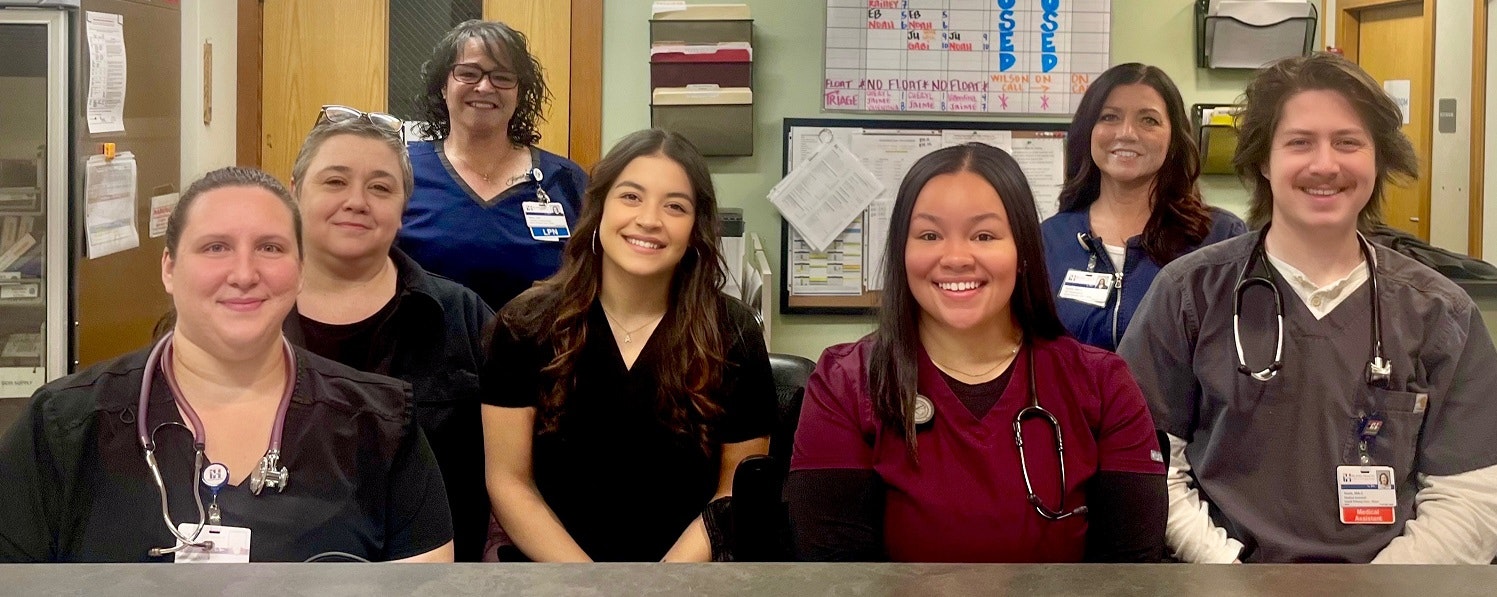Medical Assistants: A Guided Path to Helping Others

Medical Assistant Kailley describes her work at Island Primary Care - Orcas as the “most challenging and rewarding career [she] could have ever fathomed pursuing.” Kailley is part of a tight-knit Medical Assistant (MA) team, a group of professionals from various backgrounds dedicated to keeping our island healthy. Most of them grew up on Orcas, while one enjoys her job at the clinic so much that she commutes from off-island.
Our certified medical assistants are in charge of rooming patients, keeping track of vitals and vaccinations, and performing procedures ordered by the providers that they are trained to do. These include but are not limited to antibiotic injections, operating point-of-care machines, and blood draws. They are overseen by Licensed Practical Nurse (or LPN) Mary, who has practiced on Orcas Island since 2015. She administers IV care, patient assessments (triage), and injections and delegates medical assistance to the MAs.
Here on Orcas, Medical Assistant training is conducted through the Clinic’s MA-R to MA-C program in coordination with Highline Community College. The program is built for people with no previous medical training who are interested in becoming MAs. They register with the state and receive hands-on training by Mary. They learn to assess basic vital signs and complete six weeks of online classwork as MA-Rs (registered MAs) before taking a test to receive their certification (making them MA-Cs,) which can then be used anywhere in the state. What’s so great about this program is that it only requires a GED or high school diploma. Says Mary, “It’s a program for anybody... who is interested in becoming a part of the field or who just wants to jump-start their career.” After receiving their certification, students have gone on to pursue work in related fields, such as emergency medicine or nursing. MA Noah, who went through the program, says: “It’s a big part of the reason why I came to the island and why I stayed... seeing the Clinic commit to putting in the work to get people trained...” As the most recent grad of the program, Kailley added, “If this program didn’t exist, I doubt I would have pursued this line of work... I would never have anticipated how much I’d enjoy this position, and now I can see myself continuing to pursue higher education in this field.”
Clinic phlebotomist Syann (aka “Queen of the Lab”) also started as a medical assistant. She was one of thirty students in the first-ever class of Skagit Valley College’s MA program. After dabbling in different specialties, she eventually put her MA skills into use as a lab phlebotomist. Her job now entails drawing, processing, shipping, and packaging blood, taking care of biopsies and swabs, and maintaining quality control of the Clinic’s machines.
The MA team is a machine in their own right. “It was kind of difficult at first,” MA Alenna told me, “but everyone [eventually] got a feel of, We’re all in this together. We all have the same amount of patients; We all do the same job; And we’re all going to have each other’s backs.” Noah agreed: “Even when things are getting crazy, I have people I can fall back on who will keep it together and keep the [team operating] smoothly.”
Bridget, who worked at the front desk of Island Primary Care - Orcas and trained under Mary before stepping back from the Clinic, is now returning to start again as an MA-R and hopes to follow in the rest of the team’s footsteps to become certified. Bridget described her move back to the Clinic (one which was greatly celebrated by the MA team) as “coming home.”
Looking to 2025, the team is hoping to see an increase in specialty care, such as cardiology, pulmonology, and diabetes counseling. They know it can be hard to “lure” people out to our tiny, rural clinic, but they want others to get the unique experience of working on Orcas and serving our incredible community.
by Gray Gailey
